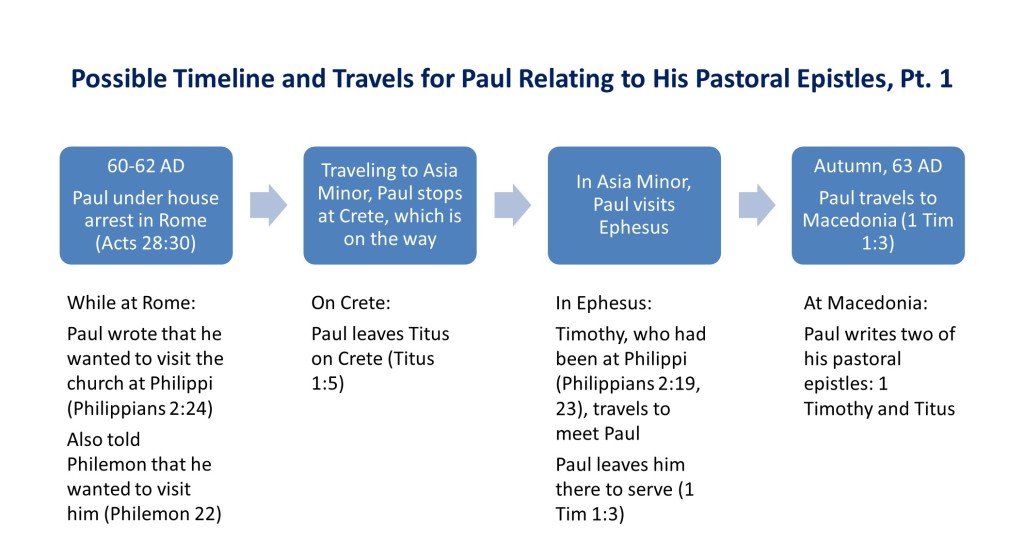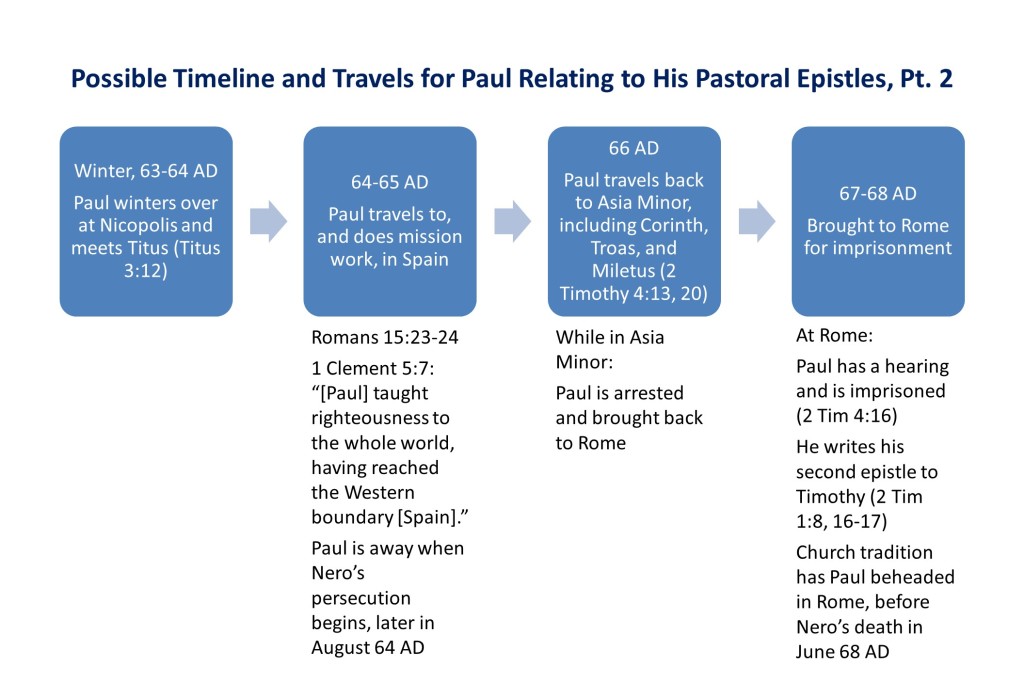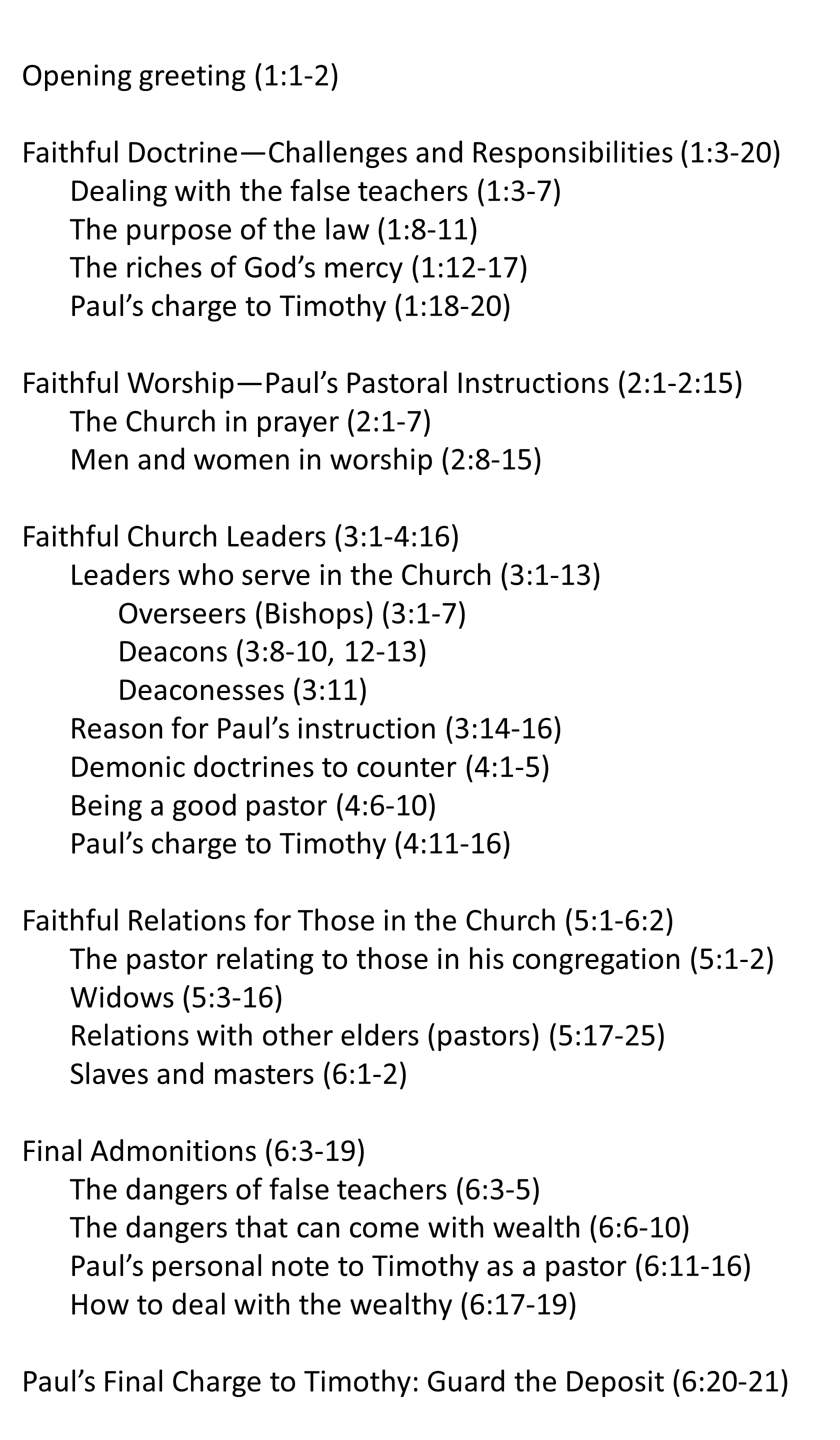 Before we delve into 1 Timothy, a general survey of what we call “the Pastoral Epistles” would be helpful.
Before we delve into 1 Timothy, a general survey of what we call “the Pastoral Epistles” would be helpful.
Introduction to the Pastoral Epistles
What are the Pastoral Epistles? They are the New-Testament books of 1 and 2 Timothy and Titus. It is good to study them together because they are the last three letters of Paul and share doctrinal content and concerns.
Authorship
From the earliest, the Church unanimously held that Paul wrote 1 and 2 Timothy and Titus. The earliest, non-biblical evidence all point to Paul as the author. Clement, the 4th Bishop of Rome (96 AD), and Polycarp, a student of the Apostle John (120 AD), simply accepted the Pastoral Epistles as letters from Paul. For example, Polycarp used 1 Timothy 6:7 and 10 as an authoritative source in his letter to the Philippians (4:1). He would only do that if he considered 1 Timothy to be of apostolic origin. Later Church fathers—Irenaeus (180 AD), Tertullian (200 AD), and Clement of Alexandria (200 AD)—directly stated that Paul was the author.
However, for a couple of reasons, some began to challenge Paul’s authorship in the early 1800s. First, the rest of the New Testament does not confirm Paul’s travel itinerary in the three Pastoral Epistles. This, in itself, is not significant—if the Pastoral Epistles were the last three letters that Paul wrote. That would explain why Paul’s other epistles and the book of Acts do not mention those travels.
A second challenge are differences in the original Greek of the New Testament. When someone compares Paul’s letters that all scholars agree that he wrote (Romans, 1 and 2 Corinthians, Galatians, Philippians, 1 Thessalonians, and Philemon) with the Pastoral Epistles, he finds some stylistic and vocabulary differences. To complicate it even more, the Pastoral Epistles have some hallmarks of Luke’s writing, which have led some to decide that Luke, not Paul, wrote the Pastoral Epistles.
Your pastor believes that this is much ado about nothing. When Paul traveled, he usually had a traveling companion, whom he often used as a scribe, co-author, or editor. Four of seven Paul’s “undisputed” epistles had co-authors: 1 and 2 Corinthians, Philippians, and 1 Thessalonians. So, it wouldn’t be unusual for Paul to use Luke as an editor for his Pastoral Epistles if Luke had traveled with Paul.
Second, except for Philemon, the “undisputed” epistles were written to congregations, not individuals. Because of that difference, they should have a different style and contain different content. And when someone does compare the vocabulary in the Pastoral Epistles with Paul’s “undisputed” epistles, the non-Paul-like vocabulary shows up where the Pastoral Epistles discuss subject matters not covered in Paul’s “undisputed” letters.
As for the Pastoral Epistles having some similarities to Luke’s writing, that is true. If one compared the Pastoral Epistles with Luke/Acts, he would find that they share 37 words that are not in any other book of the New Testament! And if one were to look at the 10 next most frequent words shared between those two bodies of work, he would find that those 10 words are, not in Paul’s “undisputed” epistles, but in Hebrews (10 words) and 2 Peter (7 words).
Your pastor believes that Luke served as Paul’s scribe and editor for his pastoral epistles. That Paul does not mention Luke is because they were, not just official correspondence, but also his personal letters to pastors whom he knew and loved.
Possible Timeline for Paul after the Book of Acts
Literary Structure and Styles of the Pastoral Epistles
Structurally, Paul modeled his pastoral epistles after official Government memoranda or appointment charters of his day. Timothy and Titus would have recognized that, and so they would have received the letters in that way. Thus, the form of the Pastoral Epistles also carried meaning: They were official correspondence that were to be received and followed as such.
Paul wrote 1 Timothy and Titus following a mandata principis structure, a letter through which a ruler issued private commands or instructions to a subordinate. Thus, it is not strange that Paul gave many commands and listed many duties for Pastors Timothy and Titus.
2 Timothy was more personal. It has the hallmarks of a personal paraenetic letter, which is a letter of succession. Knowing this makes sense, especially considering that Paul was in prison when he wrote 2 Timothy, not knowing if he would ever again see freedom.
Since Paul wrote these epistles to pastors, he often abbreviated the points he made in a way that he didn’t do in his congregational letters. Paul used “enthymemes,” statements that leave elements or argumentative premises unsaid, expecting Timothy or Titus to “fill in the blanks.”
For example, in 2 Timothy 3:16-17, Paul makes a couple of points: First, the Scriptures are God-breathed and, second, because of that, they are useful for teaching, pointing out errors, correcting, and equipping someone for good works. What Paul doesn’t say is, “Therefore, Timothy, you need to know the Scriptures so you can do that: Teach, point out errors, etc.”
1 Timothy
Outline
Opening Greeting: 1 Timothy 1:1-2
- Why is Paul an Apostle?
Apostle: The dictionary definition means “sent one.” However, as the New Testament mainly uses “apostle,” it means someone:
- whom Jesus Christ directly authorized and appointed to serve in such a way (2 Corinthians 12:12, Galatians 1:1, 11-12, and 1 Thessalonians 2:6)
- who saw the resurrected Jesus (Acts 1:22; 1 Corinthians 9:1, 15:3-8),
- whom God selected to be part of the foundation of the New-Covenant Church as a bearer of the gospel and of God’s revelation (Romans 1:1; Ephesians 2:20, 3:4-5; 1 Timothy 2:7; 2 Timothy 1:11),
- who had a unique leadership role in the New-Covenant Church not to be repeated after they died (1 Corinthians 12:28; 2 Corinthians 11:5, 12:11; Ephesians 4:11; 1 Thessalonians 2:6; Revelation 21:14).
- What does Paul being an apostle mean regarding the words of his pastoral epistle?
- What are the relational implications of Paul calling Timothy his “true child in the faith”?
- Discuss the implications that God [the Father] is our Savior and Christ Jesus is our hope.
Dealing with False Teachers
Read 1 Timothy 1:3-4
- What were some doing at Ephesus that Paul wanted Timothy to bring to a stop?
Different doctrine: Paul created his own compound word, which he used as a verb: “alien-teach.” Behind that idea is that Christian doctrine is set of teachings that come together as one, unified doctrine. If what is taught is not part of that, then someone is “alien teaching,” teaching something that is not part of “the faith” (see below: “The stewardship of God that is by faith”).
- What was the result of that alien teaching? (vs. 4)
“The stewardship of God that is by faith”: The word for stewardship is “household management.” The “alien teaching” had disrupted the life of the congregation (God’s household) at Ephesus. The Greek has no direct article (the) before “household management” but does have a direct article (the) before “faith.” The speculations brought about by the “alien teaching” disrupted the congregation’s functioning away from the teachings of “the faith.” Since the word for “household” also had “management” tied to it meant this: Since Paul was writing to Pastor Timothy, he, as the manager or steward of the congregation, was to deal with the problem. Paul will later tap into the idea of a congregation being the “household of God” in 1 Timothy 3:15.
Read 1 Timothy 1:5
- To whom does Paul refer when he used “our”?
- What does that imply about the pastoral ministry being a continuation of the apostolic ministry?
- What is the source of love (agape) from within a Christian that lives out such love?
- How does someone get a “pure heart,” “good conscience,” and “sincere faith.”
Read 1 Timothy 1:6-7
- What had replaced the “these” for those who had welcomed the “alien teaching”?
- Were these “alien teachers” sanctioned to do what they did?
- As teachers, how had they failed?





